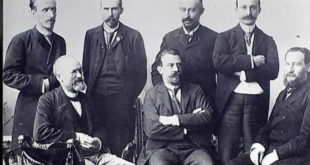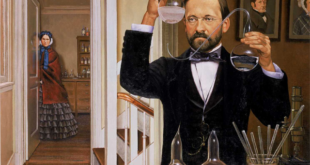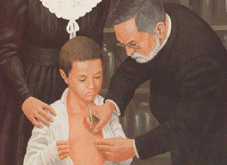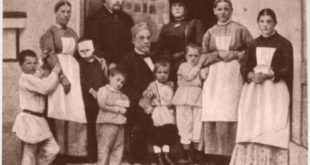Born at Dôle, 27th December 1822 – Died at Garches, near Paris, 29th December 1895
Originally printed in the Journal of pathology and bacteriology in 1896
By German Sims Woodhead, M.D.
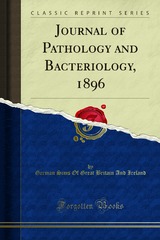
THERE has passed from amongst us one of the greatest men of the century, not before his time, but great in work accomplished, having won the esteem of all men and that honour which is only awarded to men of noble purpose and high achievement.
Louis Pasteur was born at Dole in the Jura, the ancient capital of Franche-Comte” and originally the seat of the University College now at Besancon in the Doubs. What manner of people his father and mother were is best judged from the affection and esteem in which their distinguished son held them. Pasteur’s education, commenced by his father, was continued at the Communal College of Arbois, at the University College of Besancon, and then at the Ecole Normale and the Sorbonne, where his first great investigation on the crystallography of the tartrates and the paratartrates was begun when he was still only about twenty-four years of age, and before he received his D.Sc. in 1847. This investigation was continued during his occupancy of the Professorial Chair of Physical Science in the Lycee at Dijon, whilst he was acting as Assistant Professor of Chemistry in the University of Strasburg, and after 1854 during the time that he was Dean of the Faculty of Sciences at Lille. This purely physical investigation was the real foundation of Pasteur’s contributions to the solution of some of the great biological problems that were at that time occupying the minds of the scientific world.
After his experiments on fermentation of the tartrates and on the relation of specific micro-organisms to this and other fermentative processes, followed his classification of organisms, according to their form, and also according to the conditions of food, moisture, air, and temperature under which they could exist and carry on their special functions. Even at this early period he divided micro-organisms into cerobies and anccrobies, and pointed out that it is to the faculty of wresting oxygen from sugar that certain organisms owe their power of breaking down this substance into simpler molecules, during the rearrangement of which comparatively large quantities of alcohol may be formed. Then came his experiments on the Mycodcrma aceti, during which he found that the most complex bodies could be broken down, through the agency of a series of putrefactive and fermentative organisms, into the simplest products, the anaerobic organisms doing one kind of work, the aerobic another. Through their agency all organic matter, as soon as it dies, is broken down into substances which may be assimilated by plants, the living in this way being enabled to subsist on the dead material that had been stored up by previous generations.
For his work on spontaneous generation, Pasteur was awarded the prize of the Academy of Sciences. Lister, in this country, taking Pasteur’s observations as a basis, built up his antiseptic system, which, in his hands and in those of his colleagues (amongst them the late Thomas Keith, who was great both as a man and as a surgeon), revolutionised surgery, and converted it from a mere handicraft, though a great one, to a noble art and a living science. Lister, writing to Pasteur in 1874, says:
It gives one pleasure to think that you will read with some interest what I have written about an organism which you were the first to study in your memoir on lactic fermentation. I do not know whether you read the British Medical Journal, if so you will from time to time have seen accounts of the antiseptic system, which for the last nine years I have been trying to bring to perfection. Allow me. to take this opportunity of sending to you my most cordial thanks for having, by your brilliant researches, demonstrated to me the truth of the germ theory of putrefaction, thus giving me the only principle which could lead to a happy end—the antiseptic system.
And it was indeed a happy end. The combined genius of these two men cleansed surgery from a great blot; first wounds and then wards were purified and maintained aseptic, and results hitherto undreamed of were obtained in erysipelas- and gangrene-infected wards, although better results still were obtained as the principles of treatment and ward disinfection became more widely recognised.
It is unnecessary to do more than mention Pasteur’s further researches on fermentation and putrefaction. Of his investigations into the cause and prevention of pebrinc and flacherie in the silk-worm, diseases whicli at one time threatened to destroy the silk industry of France, much might be written, as the former was the first disease that was proved by carefully-planned experiments to be due to living parasitic (Cornalia’s) corpuscles, the latter to microbes.
Eobert Boyle prophesied that “he that understands the nature of ferments and fermentation shall probably be much better able than he that ignores them, to give a fair account of divers phenomena of certain diseases (as well fevers as others) which will perhaps be never properly understood without an insight into the doctrine of fermentations.” This prophecy was fulfilled in Pasteur’s work, which, commencing with anthrax and ending with hydrophobia, was one long series of marvellous achievements, based on accurate experiments, careful analysis, and brilliant deduction. The conditions necessary for the development of the full activity of the anthrax bacillus, the effect of temperature in lowering its vitality, were first worked out; then came the observations on the attenuation of the chicken cholera virus, by keeping it for a long tune in the presence of air, and the successful protective vaccination experiments with this attenuated virus. This was followed by the production of a protective anthrax virus, a discovery to which medicine already owes so great a debt, and which promises still greater benefits to suffering humanity. In swine fever and in rabies Pasteur worked out the question of the exaltation and attenuation of a virus, by passing it through animals of different species. Of the practical outcome of his work on rabies, there remains little that has not been already often told and told well.
Though this investigation brought Pasteur’s active experimental work to a close, he still remained in constant attendance at the laboratories in the Institut Pasteur in the Eue Dutot, or in those connected with the stables at Garches, situated in the park of the old Chateau de Ville Neuve l’Etang, where the work on hydrophobia and diphtheria is carried on, guiding, advising, directing, and watching with keen interest the work of his pupils, encouraging them to overcome difficulties, and rejoicing with them in those great successes which have done so much to enable France to play so prominent a part in the advancement of medical science.
Pasteur was, as lovingly remarked by his friend and disciple Duclaux, a master amongst masters, a teacher amongst teachers, but he was something more—he was a great man. When, on the occasion of the celebration of his seventieth birthday, his admirers and disciples met in the Sorbonne to do him honour, Pasteur struck a note which vibrated in the heart of everyone present.
Je crois invinceblement que la science et la paix triompheront de l’ignorance et de la guerre; que les peuples s’entendront non pour detruire mais pour difier, et que l’avenir appartiendra a ceux qui auront le plus fait pour l’humanite souffrante. Jeunes gens, jeunes gens, confiez-vous a ces mcthodes sflres, puissantes, dont nous ne connaissons encore que les premiers secrets. Et tous, quelle que soit votre carriere, ne vous laissez pas atteindre par le scepticisme denigrant et sterile, ne vous laissez pas de’courager par les tristesses de certaines heures qui passent sur une nation. Vivez dans la paix sereine des laboratoires et des bibliotheques. Dites-vous d’abord: Qu’ai-je fait pour mon instruction ? Puis a mesure que vous avancerez: Qu’ai-je fait pour mon pays? jusq’au moment ou vous aurez peut-etre cet immense bonheur depenser que vous avez contribuiS en quelque chose au progrds et au bien de l’humanite. Mais, que les efforts soient plus ou nioins favoriscs par la vie, il faut, quand on approche du grand but, etre en droit de se dire: ‘ J’ai fait ce que j’ai pu’.
These pregnant words lay bare the soul and motive of the man more fully than could any long description and analysis of his work.
Those who at any time came in contact with Pasteur could not but be struck by his energy, directness, and simplicity ; his industry, pertinacity, and clear-sightedness ; his wonderful powers both of experiment and of deduction, and most of all by that power of induction which, amongst scientific men, is found only in those who may lay claim to genius.
Whatever may be Pasteur’s claim to honour, and how great that is, all now recognise, it undoubtedly rests upon the work which he has done in connection with the etiology and prophylaxis of some of the specific infective diseases. One line of thought, work, and reasoning is followed throughout. Each step is carefully probed and tested before a further advance is made, and once gained is never left until it has been made thoroughly sound as a point from which the next step may be made. This it is that makes Pasteur’s work so reliable, and assures for it that immortality to which only truth can attain.
When Sir Joseph Lister, presenting the gold medal on the occasion above referred to, spoke to the following effect, he well voiced the opinions of those present :—
Vraiment, il n’existe pas dans le monde entier aucun individuel auquel doivent plus qu’à vous les sciences médicales. Vos recherches sur les fermentations ont jeté un rayon puissant qui a illuminé les ténèbres funistes de la chirurgie et a changé le traitement des plaies d’un affaire d’empirisme incertain et trop souvent désastreux en un art scientifique sûrement bienfaisant Grâce a vous, la chirurgie a subi une révolution complète qui l’a dépouillée de ses erreurs et a élargi presque sans limite son pouvoir efficace. La médecine ne doit pas moins que la chirurgie, à vos études profondes et philosophiques. Vous avez levé le voile qui avait couvert pendant des siècles les maladies inf ectiuses. Vous avez démontré leur nature microbienne ; grâce à votre initiative, et dans beaucoup de ces à vos propres travaux spéciaux, il y a déjà une foule de ces desordres pernicieux dont nous connaissons complètement les causes. Cette connaissance a déjà perfectionné d’une façon surprenante le diagnostic de ces fléaux du genre humain et a indiqué la route qu’il faut suivre pour leur traitement prophylactique et curatif. L’originalité de vos travaux sur le rage était ai frappante que, à part quelque ignorants, tout le monde reconnaît maintenant la grandeur de ce que vous avez achevé contre cette maladie terrible. Vous avez fourni un diagnostic qui dissipé à coup sûr les angoisses d’incertitudes qui hautaient autrefois celui qui avait été mordu par lui chien soupçonné de la rage. Eien que cela aurait souffit pour vous assurer la gratitude éternelle de l’humanité. Mais par notre système merveillieux d’inoculations antirabiques vous avez su poursuivre le poisons après son entrée dans le système et l’y vaincre
And he concluded, ” Medicine and surgery are eager, on this great occasion, to offer you the profound homage of their admiration and their gratitude.”
At the tercentenary celebration of the anniversary of the foundation of the University of Edinburgh, Pasteur said that when a great man died his loss was mourned by all nations alike. This is, indeed, true of the man who said it, for although his loss is mourned by France, who has lost a truly loyal son, the loss mourned by the scientific world is infinitely greater, though the work that Pasteur did will never perish, and his pupils, friends, and assistants have already given proof that we may look to them, and not in vain, for the continuation of the noble work their master has commenced.
 Pasteur Brewing Louis Pasteur – Science, Health, and Brewing
Pasteur Brewing Louis Pasteur – Science, Health, and Brewing 